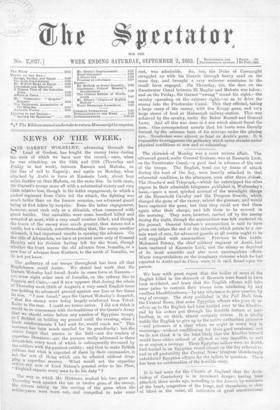The gallantry of our troops throu g hout has been all that
Englishmen could desire. We stated last week that Sir Garnet Wolseley had found Arabi in some force at Ramses,- i.e., some eight miles west of Ismailia, on the railway line to Zagazig and Cairo,—and it now appears that during the whole of Thursday week (24th of August), a very small English force was holding its advanced ground against one four or five times its size. " I now found," says Sir Garnet Wolseley's despatch, "that the enemy were being largely reinforced from Tel-el- Rebir in the rear. I could see trains arrive. I did not think it would be in consonance with the traditions of the Queen's Army that we should retire before any number of Egyptian troops, so I decided on holding my ground until the evening, when I knew reinforcements I had sent for, would reach me." This sentence has been much assailed for its grandiosity; but the critics forget that armies in the field—not the readers of superfine literature—are the persons really addressed in these despatches, every word of which is subsequently devoured by the soldiers with the greatest avidity; and that to make British soldiers feel what is expected of them by their commander, is not the sort of thing which can be effected without drop- ping a superfine reserve. What would not the superfine e England say now of Lord Nelson's general order to his Fleet, Aigland expects every man to do his duty " ?






























